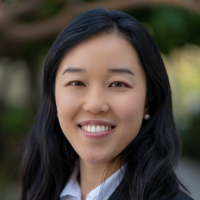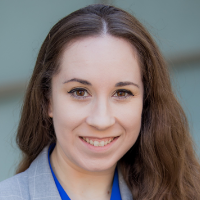
NLD Member Spotlight: Hana M. Willard

Law Offices of Jane Oak
Hana Willard is a judicial law clerk for Magistrate Judge Allison H. Goddard and could not love her work more. Before graduating from the California Western School of Law in 2019, she took an unconventional path to the bar after graduating from the University of Michigan as a Political Science major in 2009. Though she found something to love about every job she has held – including being a bartender and wine educator – Hana enjoys working in Judge Goddard’s chambers the most. “To make me leave, you’d have to drag me out kicking and screaming,” she says.
Restaurant Work Inspired Her Legal Career
Hana started working in a restaurant after college. As she took on increasingly greater responsibilities, she began questioning various business practices that she observed. A growing interest in employment law prompted her to take the LSAT. She left the restaurant in 2015 and worked as a legal assistant before starting law school at California Western School of Law in 2016.
Loving Law School & Clerkship

It is rare to hear an attorney say that she loved law school, but Hana did. She even audited extra classes because she kept failing to find a class she didn’t enjoy. Her advisor suggested that she do an externship with a judge, and she fell in love with working for the Court. After her externship, she continued working for another judge during her 3L year. She only stopped to study for the bar exam. By this time, she knew she wanted to be a judicial law clerk because she wanted to get paid doing work that she loved.
The clerkship for Judge Goddard became available while Hana was studying for the bar. She remembers applying for the position at 3 am. She took the bar exam days before Judge Goddard was sworn in. A few days later, Judge Goddard was introducing Hana to her new colleagues.
The aspects of her job that Hana enjoys most are getting to help draft orders, watching Judge Goddard preside in court, and getting exposure to different types of law all the time. “I’ve always loved to learn. I’m just like that in life. If I don’t get to work for [Judge Goddard] forever, I want to absorb as much as I can from her,” Hana says.
At the moment, Hana has no aspirations for the bench, mostly because she would like to gain some litigation experience first. “I don’t know if I’d want to stay in the objective bubble of the court or become a litigator. Judge Goddard makes it look fun, but I know it’s so hard.”
Tips for Law Students
Because her clerkship started days after her bar exam, Hana’s first tip for law students is: “If you have a chance to take time off after the bar, do it.”
Her second tip for law students is to find a mentor. “I got lucky that I work for one, but I’ve had other mentors throughout my life,” she says. When she interned at the U.S. Attorney’s office, she was mentored by her supervising attorneys. They still keep in touch today, six years later. Hana freely acknowledges that there are many things that young lawyers cannot learn on their own. Her advice is to find someone to learn from whom you respect. Professional organizations are a great place to find mentors. She recommends the Federal Bar Association to everyone. To her, relationships are the best way to find out whether working in chambers is something a young lawyer would want to do. Relationships are also helpful for gaining entry to a desired career path.
For law students considering a judicial clerkship, Hana strongly recommends doing an externship. Not only will the exposure help students decide whether they like that kind of work, the experience is a helpful resume builder. Additionally, externships can help law students get to know the judges in the court that might hire them.
Tips for Attorneys
Hana’s #1 tip for attorneys is to make sure that the cases they cite in their filings actually support their point because, often, they do not. “Attorneys should remember that someone like me is reading all the cases you’ve cited so that I can give the judge summaries. Half the time, people are citing cases that help the other side,” Hana says. Having weak – or, worse, compromising – citations ruin an attorney’s credibility. Hana says that judges remember attorneys who have a habit of citing cases that do not support their motions.
For young attorneys, Hana strongly recommends taking the extra time to make sure their writing is of high quality. “Don’t just read the paragraph you want to quote from,” Hana says. Reading the whole case can help attorneys ensure that their citations are sound.
Hana’s second tip for attorneys is to be nice. Many attorneys do not realize that judicial clerks are also attorneys, so they are sometimes rude to the clerks. “Every interaction you have with me, I tell the judge … and she remembers forever,” Hana cautions. She says that attorneys should assume that they are on speaker when they call a clerk. Rude emails are also forwarded directly to the judge. “Judges are very close with their law clerks. If you’re rude to the clerk, the judge is going to find out,” Hana says.
Hana’s advice for attorneys considering a clerkship is that litigation experience is valuable. Depending on the kind of work that is common to any chambers – e.g., discovery, summary judgment – judges often value seeing specific work experience that aligns with their focus.
In the end, being an enthusiastic learner has served Hana well in every job she’s held. However, as long as she remains in Judge Goddard’s chambers doing work that she loves, she will undoubtedly continue to help the bench serve the San Diego community well.